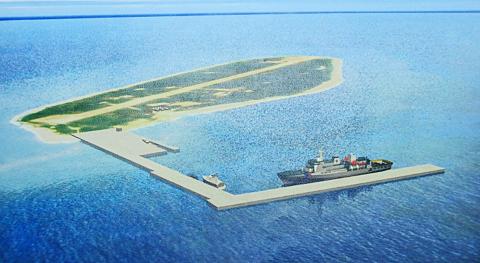Military officials yesterday confirmed that Republic of China Navy warships have docked at a recently completed pier on Itu Aba Island (Taiping Island, 太平島) in the South China Sea, and said the pier would also be able to accommodate the 10,000-tonne Panshih fast combat support ship.
The Naval Command Headquarters Office said public acknowledgment can help to enhance Taiwan’s sovereignty claim over Itu Aba and its surrounding marine territories, as it indicates the capability to maintain access to its sea lanes, and the area is under the control and protection of the navy.
The Naval Meteorological and Oceanographic Office on Monday published a warning for commercial maritime shipping of a submerged reef in the area in its Notice to Mariners, which naval authorities issue regularly to advise ships of important matters affecting navigational safety, new hydrographic information, changes in sea channels and aids to navigation.

Photo: CNA, provided by Chinese Nationalist Party (KMT) Legislator Lin Yu-fang
The notice gave the longitude and latitude of the submerged reef, with the information that it has a radius of 4m and charted depth of 3.8m, adding that “mariners are advised to navigate with caution in this area.”
Reports of the warship’s docking came to light when a group of university students returned to Taiwan on Friday after a field trip to the Spratly Islands (Nansha Islands, 南沙群島) organized by the Ministry of National Defense.
They boarded a Kang Ding-class frigate — a modified and renovated French-built La Fayette-class frigate — to sail from Zuoying Naval Base in Kaohsiung to Itu Aba, and docked at the island’s new pier, which was completed at the end of last year.
Naval officials confirmed that other warships have also docked at the pier, including the 5,000-tonne Chung Ho-class tank landing ship LST-232, to supply the remote outpost island, which is also claimed by Vietnam, the Philippines and China.
Reports said that the pier, with its 210m berth, can accommodate the Panshih, the nation’s fast combat support ship.
Development work on the island began in 2014 with a NT$3.3 billion (US$101.15 million) budget to build two new piers and a lighthouse, and extend the island’s airstrip to 1,195m to accommodate C-130 military transport aircraft.
The contract was awarded to the Taiwan Area National Expressway Engineering Bureau, with the work including improvements to the island’s electrical lighting; a storm sewer line; oil tanks and oil transmission pipelines; new paving for the airstrip; and expansion of the hangar area to accommodate two C-130 planes.
On Friday, a week before the end of his term, President Ma Ying-jeou (馬英九) organized trips for local and international media, as well as a delegation of former Chinese Nationalist Party (KMT) officials, to visit the disputed island.
Ma said that was to assert the nation’s sovereignty over Itu Aba, and the surrounding atolls and islets in the region, while opposition parties and other nations have said the actions escalated tensions in the South China Sea, and other critics have said it represented an attempt by Ma to claim the area on behalf of China.

AGING: As of last month, people aged 65 or older accounted for 20.06 percent of the total population and the number of couples who got married fell by 18,685 from 2024 Taiwan has surpassed South Korea as the country least willing to have children, with an annual crude birthrate of 4.62 per 1,000 people, Ministry of the Interior data showed yesterday. The nation was previously ranked the second-lowest country in terms of total fertility rate, or the average number of children a woman has in her lifetime. However, South Korea’s fertility rate began to recover from 2023, with total fertility rate rising from 0.72 and estimated to reach 0.82 to 0.85 by last year, and the crude birthrate projected at 6.7 per 1,000 people. Japan’s crude birthrate was projected to fall below six,

US President Donald Trump in an interview with the New York Times published on Thursday said that “it’s up to” Chinese President Xi Jinping (習近平) what China does on Taiwan, but that he would be “very unhappy” with a change in the “status quo.” “He [Xi] considers it to be a part of China, and that’s up to him what he’s going to be doing, but I’ve expressed to him that I would be very unhappy if he did that, and I don’t think he’ll do that. I hope he doesn’t do that,” Trump said. Trump made the comments in the context

SELF-DEFENSE: Tokyo has accelerated its spending goal and its defense minister said the nation needs to discuss whether it should develop nuclear-powered submarines China is ramping up objections to what it sees as Japan’s desire to acquire nuclear weapons, despite Tokyo’s longstanding renunciation of such arms, deepening another fissure in the two neighbors’ increasingly tense ties. In what appears to be a concerted effort, China’s foreign and defense ministries issued statements on Thursday condemning alleged remilitarism efforts by Tokyo. The remarks came as two of the country’s top think tanks jointly issued a 29-page report framing actions by “right-wing forces” in Japan as posing a “serious threat” to world peace. While that report did not define “right-wing forces,” the Chinese Ministry of Foreign Affairs was

PREPAREDNESS: Given the difficulty of importing ammunition during wartime, the Ministry of National Defense said it would prioritize ‘coproduction’ partnerships A newly formed unit of the Marine Corps tasked with land-based security operations has recently replaced its aging, domestically produced rifles with more advanced, US-made M4A1 rifles, a source said yesterday. The unnamed source familiar with the matter said the First Security Battalion of the Marine Corps’ Air Defense and Base Guard Group has replaced its older T65K2 rifles, which have been in service since the late 1980s, with the newly received M4A1s. The source did not say exactly when the upgrade took place or how many M4A1s were issued to the battalion. The confirmation came after Chinese-language media reported